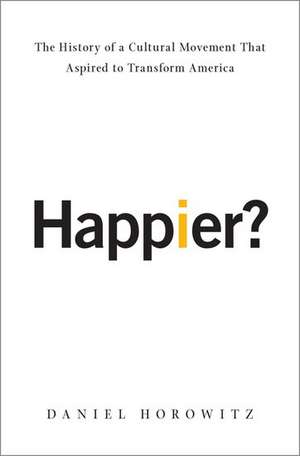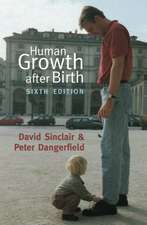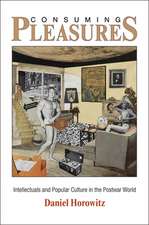Happier?: The History of A Cultural Movement that Aspired to Transform America
Autor Daniel Horowitzen Limba Engleză Hardback – 4 ian 2018
Preț: 204.75 lei
Preț vechi: 236.32 lei
-13% Nou
Puncte Express: 307
Preț estimativ în valută:
39.19€ • 40.80$ • 33.12£
39.19€ • 40.80$ • 33.12£
Carte tipărită la comandă
Livrare economică 28 februarie-06 martie
Preluare comenzi: 021 569.72.76
Specificații
ISBN-13: 9780190655648
ISBN-10: 019065564X
Pagini: 320
Dimensiuni: 236 x 160 x 33 mm
Greutate: 0.56 kg
Editura: Oxford University Press
Colecția OUP USA
Locul publicării:New York, United States
ISBN-10: 019065564X
Pagini: 320
Dimensiuni: 236 x 160 x 33 mm
Greutate: 0.56 kg
Editura: Oxford University Press
Colecția OUP USA
Locul publicării:New York, United States
Recenzii
Horowitz's study is primarily an intellectual one. Indeed, now that he has laid the groundwork with this thorough intellectual history of the movement, scholars can turn their efforts to understanding how Americans used what they learned in happiness-oriented therapies, training, and books.
Horowitz helps us see the extensive reach of psychology into American lives. And he raises the provocative question of whether happiness studies have really made us happier or whether they have lulled us into the false sense that social reforms are unnecessary.
Happier contributes to a rethinking of how to periodize the history of psychology. Horowitz's analysis suggests psychology underwent an effective revolution around the turn of this century. The history of this effective revolution remains unwritten, but Happier along with other recent titles is suggestive of its broad contours. As such, the book is essential reading for historians of psychology.
Horowitz helps us see the extensive reach of psychology into American lives. And he raises the provocative question of whether happiness studies have really made us happier or whether they have lulled us into the false sense that social reforms are unnecessary.
Happier contributes to a rethinking of how to periodize the history of psychology. Horowitz's analysis suggests psychology underwent an effective revolution around the turn of this century. The history of this effective revolution remains unwritten, but Happier along with other recent titles is suggestive of its broad contours. As such, the book is essential reading for historians of psychology.
Notă biografică
Daniel Horowitz is the Mary Huggins Gamble Foundation Chair and Professor of American Studies Emeritus at Smith College. He is a historian whose work focused on the history of consumer culture and social criticism in the U.S. during the 20th century. He has received fellowships from the National Endowment for the Humanities, and the John Simon Guggenheim Memorial Foundation. Among his publications are a biography of Betty Friedan and three books on how American and European writers, from the 1830s to the late twentieth century wrestled with the onsequences of affluence.

















